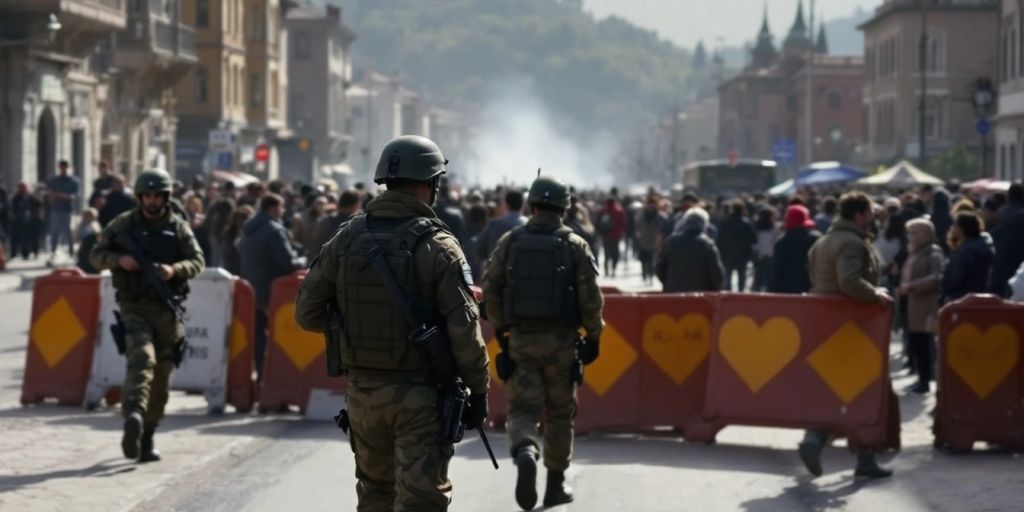Tensions in Kosovo have escalated recently, particularly in the Serb-majority north, where the Kosovo government has taken steps to assert control over the region. This has led to fears of potential conflicts spilling over into neighboring countries, raising concerns about regional stability.
Key Takeaways
- Kosovo’s government is dismantling Serbian institutions in the north, leading to increased tensions.
- Experts warn that the situation could ignite conflicts in Serbia, Bosnia and Herzegovina, and Montenegro.
- The presence of illegal weapons in Kosovo remains a significant security concern.
- Increased American involvement in the Kosovo-Serbia dialogue is anticipated to influence future negotiations.
Background of the Tensions
The recent actions by the Kosovo government to dismantle Serbian institutions in the north have been met with resistance and concern. Following a paramilitary operation allegedly supported by Serbia in September 2023, Kosovo moved to assert its authority, which included banning the use of the Serbian dinar and restricting access to Serbian services for the local Serb population. This has led to feelings of alienation among Kosovo Serbs, who are vital for any lasting peace in the region.
Potential for Regional Conflict
Dushan Janjiq, a Serbian analyst, has warned that the current situation in northern Kosovo could lead to conflicts not only within Kosovo but also in Serbia, Bosnia and Herzegovina, and Montenegro. He describes the situation as a "small fire" that could escalate if not addressed promptly. The withdrawal of Serbs from Kosovo’s institutions has created a new reality that both sides must navigate carefully to avoid further escalation.
The Role of International Actors
The involvement of the United States is expected to bring a new dynamic to the ongoing Kosovo-Serbia dialogue. With new ambassadors appointed in both countries, there is hope that their experience in negotiation processes will facilitate a resolution to the tensions. Experts believe that the U.S. can play a crucial role in consolidating Kosovo’s statehood and strengthening relations between Kosovo and Serbia.
Security Concerns: Illegal Weapons
The presence of illegal weapons in Kosovo poses a significant threat to security. The Kosovo Police have reported thousands of cases of unauthorized weapon possession, with many of these weapons believed to be remnants from the war. Experts suggest that smuggling, particularly from Serbia, may also contribute to the high number of illegal firearms in the region. The ongoing confiscation efforts by the police highlight the need for continued vigilance in addressing this issue.
Moving Forward
To de-escalate tensions, immediate steps must be taken by both Kosovo and Serbia. Kosovo should consider withdrawing special police units from Serb-majority areas and engaging in dialogue with local leaders to address their concerns. Simultaneously, Serbia must cease support for paramilitary activities and work towards a peaceful resolution. The European Union and the United States must also play a proactive role in facilitating dialogue and ensuring that the needs of the Kosovo Serb minority are addressed.
In conclusion, the situation in Kosovo remains precarious, with the potential for conflict looming. A balanced approach that considers the sovereignty of Kosovo while addressing the legitimate concerns of its Serb minority is essential for achieving lasting peace in the region.
Sources
- Kosovo’s North: A Victory with Uncertain Consequences – Modern Diplomacy, Modern Diplomacy.
- The Serbian analyst, Janjiq, warns: The north of Kosovo can ignite conflicts in three states – Telegrafi – Telegrafi, Telegrafi.
- American involvement is expected to give a new dynamic to the Kosovo-Serbia dialogue – Telegraph – Telegraph, Telegrafi.
- High number of illegal weapons in Kosovo, police confiscate thousands every year – Telegrafi – Telegrafi, Telegrafi.






